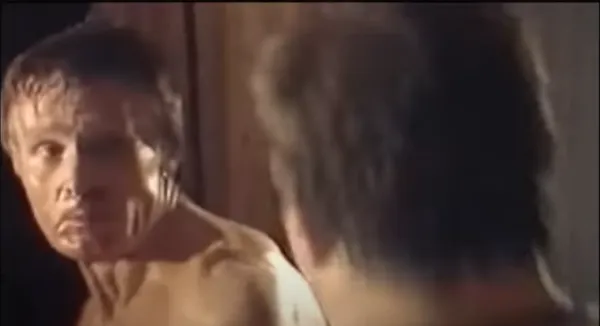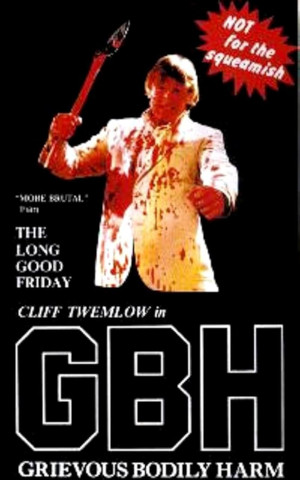Eye For Film >> Movies >> G.B.H. (1983) Film Review
G.B.H.
Reviewed by: Jennie Kermode

Fighting in films is something of a genre unto itself. Whether you love the kung-fu classics of the Shaw Bros. era, the macho heroics of Eighties blockbusters or today’s Marvel superhero punch-ups, the choreography, inventiveness and sheer brutality of a well shot fight can be thrilling to watch. In the early Eighties, however, Cliff Twemlow, a small-time star who would go on to become a legend, conceived of making a film whose fights would reflect what he had seen in real life over the course of his career as a nightclub bouncer. This, directed by his good friend David Kent-Watson, is that film, and it quickly became a cult classic.
Starring Twemlow himself, it is most popularly known as G.B.H. – the full phrase ‘grievous bodily harm’ being splashed across the screen during the opening credits sequence for those unfamiliar with it (which perhaps suggests that he was already dreaming of the international market). It’s also known as Mancunian Man – the term we hear repeated in its wonderfully catchy theme tune, composing being Twemlow’s other line of work and the one that funded much of his filmmaking. His character, you see, is a legendarily tough bouncer, just released from a six month stint in prison, known as the Mancunian. This may strike you as being a little odd given that the film is set in Manchester, but it’s best not to worry about such things.

By any technical measure, G.B.H. is a terrible film. It’s also tremendous fun to watch, and not in some smugly ironic way, but because it’s energetic, utterly unselfconscious and clearly a passion project. Making a film in the early Eighties was orders of magnitude harder than making one today, and the team behind it deserves respect for succeeding at all, especially as they were working with makeshift equipment and a mostly amateur cast, a very low budget and barely any training. Twemlow’s ambition held no bounds. He wanted to include every element he saw in Hollywood blockbusters, from action to drama, social commentary and romance, and he largely achieved that.
The romance develops after the Mancunian stands up for a young woman with a shite boyfriend and, thanks to the magic of the movies, she immediately takes a shine to him. There’s some awkward manoeuvering around the double standards of the time – she has to be a nice girl, different from the others, so she can’t be the sort of woman who would have casual sex, but at the same time she has to start sleeping with him quickly so that we can accept that they’re in love and the plot can progress – but once this is established, there’s a new force in his life prompting him to reassess his behaviour and what he wants out of life. His heterosexuality is also firmly established (bisexuality not really existing in the popular cinema of the period), which fends off any awkward questions about his close relationship with fellow bouncer Chris (Brett Sinclair), with whom he enjoys soft focus runs in the park whilst romantic music plays.
In writing this, I am aware that some people working as door stewards don’t like the term bouncer; it may very well be inappropriate for them, but in the context of this film it is, if anything, an overly generous description of the profession. Fighting happens all the time, and vigorously. Notably, no furniture is broken, probably because the production could only afford to borrow it, but there’s plenty of punching and slamming of heads into walls and that sort of thing, and a fair bit of blood by the standards of the time. There’s also a first person perspective getting punched in the eye shot that is genuinely innovative. Kent-Watson, who had a background in making wedding videos, has the basics of the director’s art down, even if he’s let down badly by the editing. With a group of gangsters trying to take over Manchester’s clubland, there’s ample justification for violence, and Twemlow’s script also takes a swipe at the various amateur troublemakers he had encountered in the past.
The sets are real clubs, the extras real clubgoers (some of whom are pretty impressive dancers). The dialogue is... not very realistic. It’s the juxtaposition, as much as anything, that makes this so entertaining. Lovingly restored by Severin Films, it still looks rough due to the state of the VHS originals, but that’s important to its character, and as such it’s good to see that they haven’t fallen prey to the temptation to spruce it up with generative AI. The biggest surprise is that they have managed to produce a version that doesn’t have fuzzy white bands of static across the sex scenes, which are also quite daring for the time. With that in mind, it is perhaps not quite the full VHS experience, but it’s certainly an experience that will stay with you.
Reviewed on: 25 May 2025

















